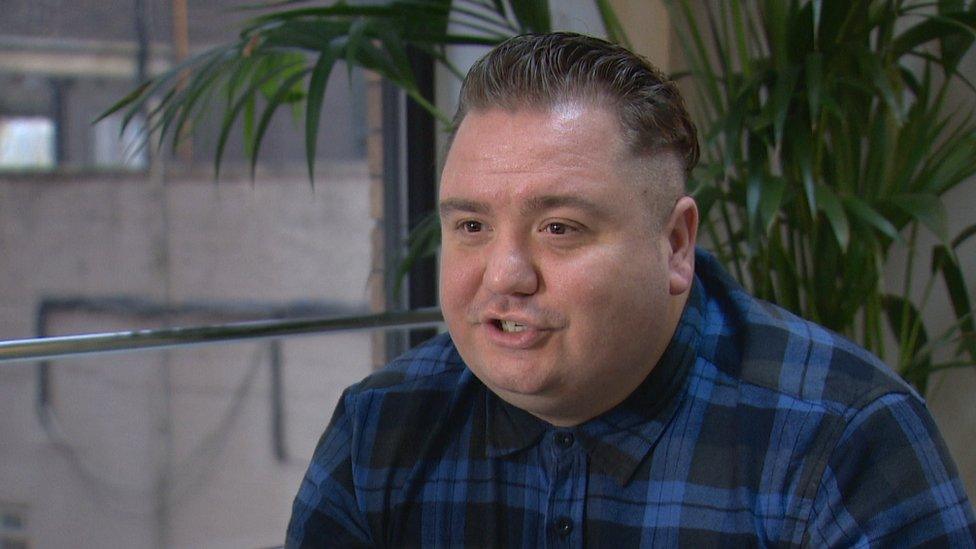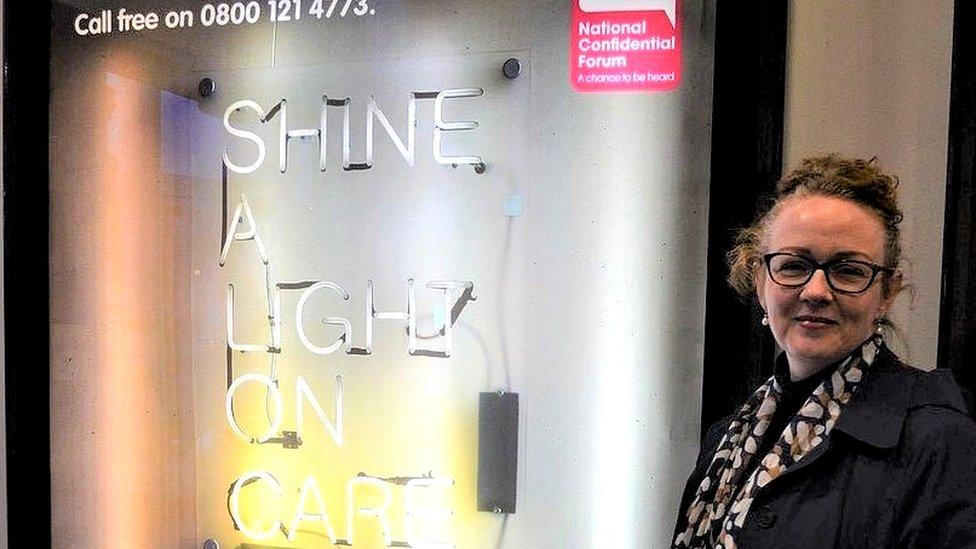The misery of Christmas for Scots who have been in care
- Published

David Grimm was given an Argos catalogue and told to choose his own Christmas present when he was in residential care
In the first 20 years of his life, David Grimm had more than 50 addresses. Over that time he moved around residential, foster and kinship care - and with his mother - even womens' refuges.
Now aged 31, and studying at university for a social work degree, David is one of thousands of adults with experience of the care system for whom Christmas can be a very difficult time.
"It has been a mix of good and bad," he told BBC Scotland.
He was in residential care for five years, and at Christmas many of the young people were expected to go home to their families for the day.
"For a lot of people this would be cancelled even on the morning of Christmas Day," he said.
"The young people would have their hopes and they would be smashed, so it's a very depressive environment at Christmas."
David said a number of his friends from care had died over the festive period.
He sometimes felt he was always on the outside, and felt guilty about intruding on the Christmas celebrations of others.
'Emotional pain' from childhood memories

NCF's campaign is aimed at hearing from adults with care experience to help ensure children now and in the future have a better time at Christmas
He was speaking as a Scottish government-funded organisation, the National Confidential Forum (NCF), launched its #ShineALightOnCare campaign to highlight the fact Christmas can be a very difficult time for people who have been in care.
NCF said there were currently around 17,500 young people in residential or institutional care in Scotland, but it wanted to hear from adults who had previously experienced the care system as a child.
Its head, Jayne Laidlaw, said: "Adults who experienced care in childhood can suffer emotional pain and distress during the festive season from the memories of previous years filled with unhappiness, neglect or abuse.
"At a time when families are gathering together to celebrate, many care-experienced adults feel more isolated and alone with their thoughts.
"Many feel unable to articulate their distress to those close to them and some hide their trauma so as not to cause upset to their loved ones."
She said people could speak to the NCF in confidence and find "relief and comfort" by sharing the memories they had been carrying.
'Christmas time can act as a trigger'
One person who has already given their testimony to NCF said: "Because of all those years without celebrating Christmas, I'm now embarrassed when I receive a Christmas present.
"I don't think it's sufficient just to say 'thank you'. I feel I should be really grateful and all these sort of things that go with it. That's why I don't like Christmas."
Forum member Dr Tara Pennington-Twist, a consultant clinical psychologist, said many of the experiences relating to Christmas which they had heard were very sad.

"Some people went into care and never received any Christmas presents, never had any acknowledgement that it was Christmas, no Christmas dinners, none of those things you would expect children to enjoy at Christmas time," she said.
"Equally, we have heard from care-experienced people who for the first time, when they entered care they were able to understand and celebrate Christmas in a way that they had never been able to do as children before they had gone into care.
"Christmas time can act as a trigger for care-experienced people. We have heard from people talking about the guilt they experience at Christmas when they receive presents because that was never their experience when they were in care or prior to them going into care."
David Grimm said one of the worst aspects of spending the festive season in care was when he was asked to pick his own Christmas present.
He was handed an Argos catalogue and told to circle the gifts he wanted - as long they were within the budget set by the local authority.
But this year he says he is looking forward to Christmas Day, as he is spending it with a close friend, her partner and their children.
NCF urged anyone who had been in care and struggling over the festive period to speak to them in confidence. The forum says their contributions will ensure Scotland learns from the past to make things better for children in care now and in the future.